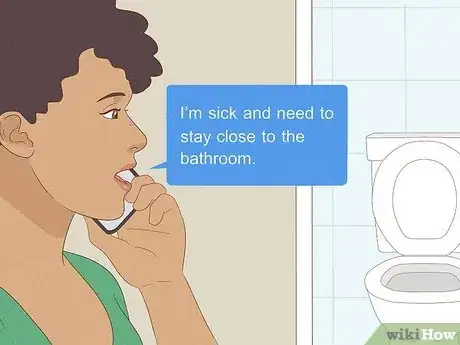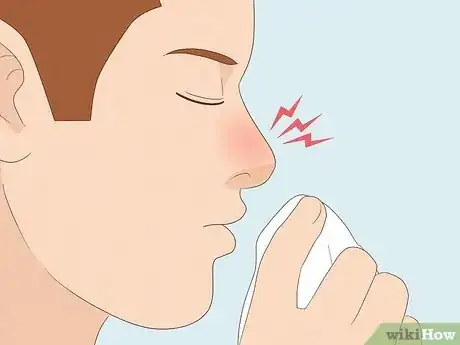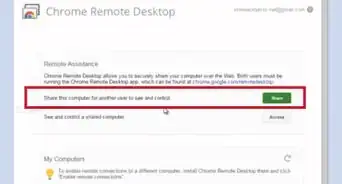This article was co-authored by Amber Rosenberg, PCC and by wikiHow staff writer, Hunter Rising. Amber Rosenberg is a Professional Life Coach, Career Coach, and Executive Coach based in the San Francisco Bay Area. As the owner of Pacific Life Coach, she has 20+ years of coaching experience and a background in corporations, tech companies, and nonprofits. Amber trained with the Coaches Training Institute and is a member of the International Coaching Federation (ICF).
There are 13 references cited in this article, which can be found at the bottom of the page.
This article has been viewed 48,913 times.
Digestive issues have you in and out of the bathroom, but your work shift is coming up. Should you call in and tell your boss all about your symptoms? While you should call into work if you have diarrhea, there are more professional ways to let your boss know the reason you’re taking the day off. Keep reading to find out what you should say to your boss if you have diarrhea, plus other good reasons for you to call in sick.
Things You Should Know
- Tell your boss you’re dealing with a “stomach bug” or “upset stomach” so you don’t have to get into the details.
- Mention that you need to be close to the bathroom so your boss gets what symptoms you have without telling them directly.
- Wait until your diarrhea has gone away for 24 hours before returning to work so you don’t spread any infections.
Steps
Expert Q&A
-
QuestionWhen is the best time to call in sick to work?
 Amber Rosenberg, PCCAmber Rosenberg is a Professional Life Coach, Career Coach, and Executive Coach based in the San Francisco Bay Area. As the owner of Pacific Life Coach, she has 20+ years of coaching experience and a background in corporations, tech companies, and nonprofits. Amber trained with the Coaches Training Institute and is a member of the International Coaching Federation (ICF).
Amber Rosenberg, PCCAmber Rosenberg is a Professional Life Coach, Career Coach, and Executive Coach based in the San Francisco Bay Area. As the owner of Pacific Life Coach, she has 20+ years of coaching experience and a background in corporations, tech companies, and nonprofits. Amber trained with the Coaches Training Institute and is a member of the International Coaching Federation (ICF).
Pacific Life Coach Call in sick as soon as you realize you're not going to make it to work. You could call in sick the night before if you know you're going to feel too ill to go in the next day. Otherwise, call your boss first thing in the morning. Try to give your boss as much notice as you can so they can find coverage or work around your absence.
Call in sick as soon as you realize you're not going to make it to work. You could call in sick the night before if you know you're going to feel too ill to go in the next day. Otherwise, call your boss first thing in the morning. Try to give your boss as much notice as you can so they can find coverage or work around your absence.
Warnings
- See your doctor if you have diarrhea for longer than 2 days without improvement, become dehydrated, or have black or bloody stools.[15]⧼thumbs_response⧽
- Ask a doctor before taking any anti-diarrheal medications. Even though they may make your symptoms better, they might prevent your body from getting rid of an infection.[16]⧼thumbs_response⧽
References
- ↑ https://www.chop.edu/news/health-tip/how-survive-when-stomach-bug-hits-your-household
- ↑ https://www.cdc.gov/foodsafety/symptoms.html
- ↑ https://hbr.org/2021/04/parents-take-your-sick-days
- ↑ https://www.health.state.mn.us/people/foodsafety/dwi/eicondguide.pdf
- ↑ https://psychcentral.com/lib/calling-in-sick-to-work#1
- ↑ https://share.upmc.com/2017/03/when-to-call-off-work-sick/
- ↑ https://www.nhs.uk/conditions/norovirus/
- ↑ https://psychcentral.com/lib/calling-in-sick-to-work#1
- ↑ https://share.upmc.com/2017/03/when-to-call-off-work-sick/
- ↑ https://www.cdc.gov/hygiene/personal-hygiene/coughing-sneezing.html
- ↑ https://dhhs.ne.gov/Documents/COVID-19%20Guidance%20to%20Public%20and%20Testing.pdf
- ↑ https://psychcentral.com/lib/calling-in-sick-to-work#3
- ↑ https://hbr.org/2021/04/parents-take-your-sick-days
- ↑ https://familydoctor.org/condition/vomiting-and-diarrhea/
- ↑ https://www.mayoclinic.org/diseases-conditions/diarrhea/symptoms-causes/syc-20352241
- ↑ https://www.mayoclinic.org/diseases-conditions/diarrhea/diagnosis-treatment/drc-20352246











































































Medical Disclaimer
The content of this article is not intended to be a substitute for professional medical advice, examination, diagnosis, or treatment. You should always contact your doctor or other qualified healthcare professional before starting, changing, or stopping any kind of health treatment.
Read More...